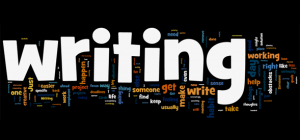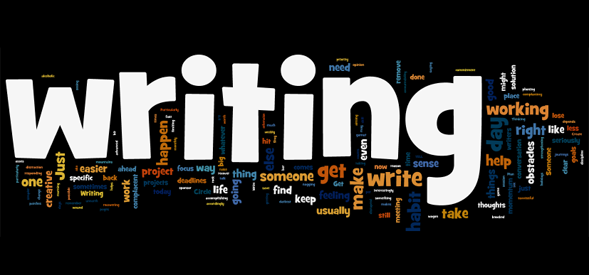
by Jenna | Jan 22, 2015 | Writing Articles
When it comes to rewarding ourselves for writing, I see many writers being stingy about it.
Please don't be stingy!
In my writing community we have a question on our daily progress report that says, "How will you acknowledge or celebrate what you’ve accomplished today?" And every day we fill our answers into this little box:

We do this to bring attention to the importance of the practice of rewarding ourselves for writing.
But what fascinates me is how often we collectively avoid or sidestep this question.
Even I find often myself answering with something that I was already planning to do, which isn't exactly a true reward. Sure, it's a nice thing I'm doing for myself at the end of the day, but it isn't actually tied to the writing. (On the other hand, as a still relatively sleep deprived new mom, when I write "Go to bed" in that little box, I'm usually THRILLED to be making that my reward, and it really does feel like one.)
But are we doing ourselves any favors by avoiding rewarding ourselves for writing or not creating special rewards just for the writing?
I don't think so.
Why we might not reward ourselves for writing
Here are some reasons why we might not reward -- or want to reward -- ourselves for writing.
1. Not rewarding ourselves can be a form of self-punishment.
Some writers feel that they "don't deserve" a reward because they haven't reached their goal for the day, even if they did actually show up and write.
Or sometimes writers are writing but feel they aren't working on the "right" project, so they punish themselves by not rewarding, acknowledging, or celebrating the writing they did do.
Some writers use the lack of a reward as a way of being hard on themselves.
Here's why this is a bad idea: Self-punishment (of any kind) sets up a negative association with our writing. When we are constantly hard on ourselves for not writing enough, writing the right thing, or not meeting our (sometimes unrealistic!) goals, we create disincentives associated with our writing. Rewards, on the other hand, create incentives to write. And considering that showing up to write and sticking with it can be a herculean task on many, many days, disincentives are the last things we need.
2. It feels hard to think of something to reward yourself with.
Sometimes it's just hard to come up with something as a reward, so it's easy to phone it in by picking something you were already planning to do or giving up.
On the other hand, if that something you were already planning to do is what you would normally be procrastinating with (TV, Facebook, games, etc), that's not such a bad idea. Sometimes a little delayed gratification IS a great reward. But it's not a great choice if you aren't intentional about it, meaning that you decide BEFORE you write that your treat at the end will be a little Facebook surfing time.
What worries me about not coming up with rewards: I suspect that an inability to come up with an idea for a reward is tied to that feeling that we don't deserve one. I also think it devalues the act of writing. While some might say that we shouldn't need rewards for doing what we were put here to do, I disagree. Our big dreams -- as much as we WANT them -- are often shunted to the side for other less meaningful pastimes and obligations. So when we actually do the work of overcoming the massive amounts of inertia and resistance to actually write, it's worth rewarding.
3. Rewarding feels like another thing to do.
When we are busy -- in writing and in life -- creating space for a reward for ourselves can feel like just one more thing on a very long list of To Do's. Who wants to do that? It might even feel like an interruption of one's flow in the day or in life to stop and acknowledge or celebrate what we've accomplished.
I know writers who are so frantic to keep up with even their own self-imposed deadlines that they cannot imagine stopping to celebrate what they've done.
Here's why we might want to rethink this: Positive experiences create positive associations with writing, much as rewards can be incentives. Plus, I don't know about you, but there is always more work to do, and a dearth of pleasurable moments. Why not make the effort to create more moments of delight in our lives, and why not associate them with our writing?
4. It feels like we never accomplish enough to celebrate or reward anything.
Writers always have more writing to do. The next project, the next deadline, the next ambition. When you have an endless laundry list of writing and tasks and To Do's, it feels like you have never ever done enough. And why would you reward yourself for being so behind?
But here's the hidden cost of never being satisfied with what you done: Writing without rewards will suck the life and joy out of your writing eventually. You might be able to keep pushing through for months, years even. But your creative outputs deserve to be balanced with delicious inputs. Your hard work deserves acknowledgement. Don't let a day go by without celebrating the fact that you are making your dream happen, word by word. (And definitely do NOT miss celebrating the big milestones either. Finish a draft? Give yourself something really special, even if it's just a day off to enjoy the sunshine.)
5. Writing feels like its own reward.
Often writers feel like writing is its own reward. And sometimes it really is. Sometimes at the end of a long day, writing is what we do to relax and reward ourselves for working our day jobs or taking care of the kids. So it can feel silly or extraneous to reward yourself for writing when it already feels like a treat.
Here's the issue I see with this: When we write as the reward, it can make it harder to do the writing on days when we "don't feel like it" or we are "too tired". Having a separate reward makes it easier to show up and do the writing no matter what, because we don't want to tie our writing to a being "in the right mood".
Change your anti-reward habit with these strategies
Here are some thoughts about how you can change up your pattern with rewards.
First, have a chat with yourself about what you are actually accomplishing and whether it is worth of a reward. If you stop to think about it, aren't you overcoming resistance every day to write? Wading through distractions, procrastination, fears, and doubts just to show up to the page? Isn't that worthy of acknowledgment?
Then, be intentional with your writing rewards. You might tie them directly to your writing, like giving yourself treats that are writing related (a writing book, a special pen, a class), or looking for ways you can be self-nourishing and creative-well filling. One of my community coaches, Terri Fedonczak, choses rewards that are related to one of the five senses, like having tea under a cozy blanket, sitting outside near the water or in the sunshine, taking a few minutes to snuggle her dogs, or burning incense in her writing corner.
If you want to be an über-rewarder, pre-select your reward before you even begin writing for the day, or plan the reward the evening before along with your writing for the next day. Sometimes our yesterday selves are kinder and wiser than our today selves. You can pre-select rewards for your daily writing and rewards for hitting your writing milestones, like your meeting your weekly goals and completing major drafts. You might even want to make a list of your favorite treats NOW and have it to pick from when you sit down to write.
(Check out this article for more on rewards, and also a li of reward ideas.)
Last, make an effort to reward yourself as quickly as possible when you complete your writing, even within a few minutes of finishing. As my (former) favorite writer, Joss Whedon, says, "I have a reward system. I am the monkey with the pellet and it’s so bad that I write almost everything in restaurants or cafés [so] that when I have an idea, I go and get chocolate." The interviewer from the article says, "He doesn’t wait to flesh out the idea and then reward himself, he rewards himself simply for having the idea." How's THAT for an über-rewarder?
You may also be interested in:

by Jenna | Jan 7, 2015 | Writing Articles
Apparently I think in sevens a lot, at least when it comes to writing about writing.
As I was reviewing the most-read posts of 2014, apparently sevens were appealing to you, too.
These "7's" posts were among the most popular last year, counting down to your favorite (and there's no surprise to me there about why that one was the favorite -- it's something we all deal with!)
So, in reverse order, our lucky sevens:
7 steps to recovering from creative burnout
 When you get burned out, it's hard to do anything, let alone be creative. In this article, I outline seven steps you can take to go from creative burnout to creative recovery, so you can bring back the joy you feel when you create. This is an important skill to master because sometimes -- even when we're doing our very best to keep the creative well filled and do our writing at a sustainable pace -- resistance, deadlines, life, and fate conspire to the point where we're scrambling to finish a project under a big time crunch, binge-write, and exhaust ourselves as a result (sometimes doing so for days, weeks, even months on end). And once we've hit that bottom of the creative barrel, writing anything sounds entirely miserable. Read this article to find out how to bring yourself back into creative balance.
When you get burned out, it's hard to do anything, let alone be creative. In this article, I outline seven steps you can take to go from creative burnout to creative recovery, so you can bring back the joy you feel when you create. This is an important skill to master because sometimes -- even when we're doing our very best to keep the creative well filled and do our writing at a sustainable pace -- resistance, deadlines, life, and fate conspire to the point where we're scrambling to finish a project under a big time crunch, binge-write, and exhaust ourselves as a result (sometimes doing so for days, weeks, even months on end). And once we've hit that bottom of the creative barrel, writing anything sounds entirely miserable. Read this article to find out how to bring yourself back into creative balance.
7 ways to recommit to your writing
 Sometimes as writers we get into a good writing practice but still manage to become complacent about actually FINISHING projects and moving on to the next one, rather just making small amounts of progress or endlessly rewriting and editing. When that happens, it's time to recommit, and raise the bar of our own expectations. In this article, I discuss seven ways to stop phoning it in and require more of yourself as a writer. Read this article to find out how to to recommit to your own writing.
Sometimes as writers we get into a good writing practice but still manage to become complacent about actually FINISHING projects and moving on to the next one, rather just making small amounts of progress or endlessly rewriting and editing. When that happens, it's time to recommit, and raise the bar of our own expectations. In this article, I discuss seven ways to stop phoning it in and require more of yourself as a writer. Read this article to find out how to to recommit to your own writing.
7 ways to overcome fear and uncertainty about writing
 In this terrific guest post, produced screenwriter Sarah Newman talks about how to stay in action and keep moving forward with our writing even when fear and uncertainty rear their ugly heads. She shares a list of seven great ways to get unstuck and keep writing that I'm sure you will find both handy and inspiring. Read her article and discover how to get into action with your writing.
In this terrific guest post, produced screenwriter Sarah Newman talks about how to stay in action and keep moving forward with our writing even when fear and uncertainty rear their ugly heads. She shares a list of seven great ways to get unstuck and keep writing that I'm sure you will find both handy and inspiring. Read her article and discover how to get into action with your writing.
My 7 part series, "Make 2015 your year to write"
 Our most recent "7's" post was my seven-part series, called "Make 2015 Your Year to Write". If you missed it, it's not too late to work with the writing prompts in the series that will help you design and create goals and resolutions for your writing year (2015 or otherwise!) so that they are well-aligned with what you want in the big picture. That way you can make sure you're working grounded in the reality of where you are right now as a writer and where you want to end up.
Our most recent "7's" post was my seven-part series, called "Make 2015 Your Year to Write". If you missed it, it's not too late to work with the writing prompts in the series that will help you design and create goals and resolutions for your writing year (2015 or otherwise!) so that they are well-aligned with what you want in the big picture. That way you can make sure you're working grounded in the reality of where you are right now as a writer and where you want to end up.
7 tips for staying motivated by self-created deadlines
 This article ties in neatly with the article on recommitting, because self-created deadlines can be a powerfully motivating when it comes to hunkering down and doing the work. In this piece I talk about seven strategies you can use to make your inner deadlines actually mean something. Hint: It often involves turning those "inner" deadlines into outer ones. Read more about mastering your self-created deadlines here. (And see if you can guess which one is my favorite!)
This article ties in neatly with the article on recommitting, because self-created deadlines can be a powerfully motivating when it comes to hunkering down and doing the work. In this piece I talk about seven strategies you can use to make your inner deadlines actually mean something. Hint: It often involves turning those "inner" deadlines into outer ones. Read more about mastering your self-created deadlines here. (And see if you can guess which one is my favorite!)
And your favorite "7" post: 7 ways to beat procrastination
 This article was your favorite "7" post, and it's one of mine too. And it's no surprise. Procrastination is one of the biggest things we struggle with as writers. In the piece I talk about the most common reasons for procrastination and seven ways to beat it, including some things you may not have thought of, like setting super small micro goals, telling others about what you're doing to create accountability for yourself, and knowing when to STOP writing. Check it out here and bust your own procrastination habit while you're at it.
This article was your favorite "7" post, and it's one of mine too. And it's no surprise. Procrastination is one of the biggest things we struggle with as writers. In the piece I talk about the most common reasons for procrastination and seven ways to beat it, including some things you may not have thought of, like setting super small micro goals, telling others about what you're doing to create accountability for yourself, and knowing when to STOP writing. Check it out here and bust your own procrastination habit while you're at it.
Enjoy, writers!
I hope your 2015 is off to a great start.
Happy writing.


by Jenna | Dec 18, 2014 | Writing Articles
I was raised in a family where there's a right way and a wrong way, and great woe to the one who chose the wrong way. It was my early training program in perfectionism.
I learned to figure out what the right way was, and always do that. It was safer that way. And easier.
But it wasn't very creative. And it certainly didn't foster much in the way of independent thinking.
Over the years I've gotten better and better about doing things -- including writing -- even when I can do them far less than perfectly. I've learned to be willing to make mistakes, to try things, to "ship" before I'm ready, to create tons of accountability for myself so I can push through where I used to get stuck in the past, and to live more on my own creative edge.
So imagine my surprise in discovering that my own perfectionism was alive and well -- raging even -- this year.
It's an evil thing, perfectionism. So sweet at times. We'll talk about "a perfect day" with a sigh -- and we mean it, it was lovely and delicious and wonderful, everything felt just right. But how do we go from that to the paralyzed inaction of perfectionism when we can't figure out the exact right thing to write?
The insidious nature of perfectionism
For the record, perfectionism is defined as a “refusal to accept any standard short of perfection.” It means having such impossibly high standards that nothing can ever measure up.
Ever.
Including ourselves.
And it mucks up many aspects of our lives, including our relationships, finances, parenting, self-care, health habits, and especially our creativity. It rips holes in our self-esteem and our productivity if we let it.
Let's talk about how perfectionism works in a creative process:
- Perfectionism triggers procrastination. If we don't know the answer in a creative project, we often stop and wait until we can figure it out (or bang our heads against the wall trying to solve it before proceeding). If it doesn't feel right it must therefore be wrong, but what could the right answer be? This can trigger a kind of obsessive procrastination that sometimes looks productive, but isn't -- researching, discussing, debating, thinking about -- instead of writing.
- Perfectionism feels safer. If I can't get it done perfectly, then I won't do it at all. It's a very black and white, fixed mindset that doesn't allow for learning, growth, or much creativity. (Creativity is MESSY!)
- Perfectionism leads to paralysis. If we procrastinate long enough, waiting for the right answers, we can stumble into a lasting paralysis. I don't know what to do, I can't do anything. I'm blocked! I can't figure out which way to go. I better stay right here.
- Perfectionism keeps us from getting feedback. Perfectionists are often extremely reluctant to share our work with anyone or ask for feedback on it. We are terrified of finding out it's not good enough, not done yet, and will require more work. More work that we can hardly bear to do because it's so painstaking. What if they hate my writing? What if I'm not as good as I should be and they can tell? What if they find out that I am an impostor? Ironically, perfectionists often reject the feedback they receive as well, usually as "not good enough".
- Perfectionism keeps us from finishing. There's nothing like not finishing to guarantee that no one will notice that the work is less than perfect. It's much, much "safer" not to finish. It's not living up to what I imagined it would be. It just feels wrong. I'm stuck. I can't finish. I'll never finish. There's no point. But not finishing creates self-doubt and its own kind of paralysis: I must not love writing enough. I'm not a real writer.
- Perfectionism is an escape hatch. This is a tricky one that Corey Mandell talks about. We sometimes use perfectionism to let us off the hook. We create situations where we "don't have enough time" to get it done perfectly so we phone it in, require less of ourselves, or rush to do it all at the last minute. So when we turn in less-than-our-best work, we have an excuse for why we couldn't live up to our own impossibly high standards.
Three antidotes for perfectionism
I've recently experienced a perfect storm of three different antidotes for perfectionism that came together in a powerful way.
Antidote #1: Think of perfectionism as just one of many ways to write
One of my mentors, Hal Croasmun of ScreenwritingU, has been talking about perfectionism in the Master Screenwriting Certificate program I'm taking. I've been hearing him talk about it for months, but honestly? I kept telling myself that I knew better than to fall for my own perfectionism and that I wasn't falling for it, because I was still writing.
But I was also writing more slowly than I wanted to be writing, and I was finding that I was struggling to "figure out" a lot of my story. The answers weren't coming easily, and I kept finding myself in rabbit hole after rabbit hole of confusion and overthinking.
When Hal described perfectionism as "just one of many processes" we can use as writers, I started seeing it in a new way.
He says we have many methods to choose from when we write, and perfectionism is an excellent tool for our final, polished draft. But it is not a good tool for getting our first drafts written.
He got me thinking about how I was going about my writing process: I was going along, completing the assignments he had given us, and any time I hit a place I was confused, I would stop, and try to figure it out. Sounds pretty normal, right? But what I wasn't noticing were all the arguments I was having with myself while I was doing that, like:
- You have to get this right or people will think you don't know what you're doing.
- You should have gotten a science degree if you were serious about writing sci-fi.
- It won't be real sci-fi, it'll just be a crummy space opera. (For the record I love space operas.)
- You need to do a ton more research.
- You've got to know exactly how this world works or it'll never make sense and the whole script will fall apart.
But after listening to Hal on the subject of perfectionism, I realized that what I was doing was trying to protect myself from failure and rejection by trying to get it done perfectly. But by doing so, I was also stopping myself from moving ahead and was falling further and further behind in class, which is not in alignment with what I actually want.
And something fell into place for me. Finally landed.
Hal has been telling us from the start of the program to give ourselves permission to write crap (I tell people this too, for goodness sakes!) and that if we don't know the answer to something, to either leave it blank or put down a guess and just move on. I made a vow to myself to do exactly that. To work with my outline and my writing process in a more experimental, exploratory way -- a different way to write -- while I'm working through this first draft.
Antidote #2: "Anything other than writing must come after writing."
Around the same time I was listening to Hal, I was also reading Chuck Wendig's latest ebook, 30 Days In the Word Mines, and stumbled onto this little gem about productivity.
"It’s very easy to do a lot of things and feel productive but, at the end, not be productive. This includes:
- editing as you go
- research
- world building
- networking/social media
- marketing (before the book is done)
- talking about writing
- reading about writing
That’s not to say these are universally unproductive or unnecessary -- but really, when you’re working on a first draft, your best and strongest foot forward is: Write. Nothing else. Produce words. Jam words into sentences. Cram sentences into paragraphs. Paragraphs into chapters. Chapters into stories. Anything other than writing must come after writing."
What if my "solutions" for my perfectionism-driven fears were manifesting as these kinds of sidetracks? What if instead I just focused on getting it down, rather than figuring it out, as Julia Cameron says?
I made another vow. No more editing. No more researching. No more looking up words in the dictionary.
Just doing the writing.
Antidote #3: You're not allowed to hate it until it's done.
I also found myself having an illuminating inner conversation last Monday morning.
After my first two vows, I'd been happily outlining on Sunday night, moving along, Getting It Done.
But then when I woke up on the next day, I found myself thinking, "I hate this script."
(I believe it is highly significant that I was having these thoughts while not working on the project. I find that I get into more trouble with my work when I'm not working on it than when I'm actually putting pen to page or fingers to keyboard.)
My negative thought-stream went on for a few minutes but then I caught myself, realizing that it was NOT helping me.
So instead I decided, "I am not allowed to hate this script until it is finished. Then I can decide what I think of it. And only then."
After all, even the Pixar folks know you don't really know what you have until something is finished... and then you rewrite!
What if it's TRULY okay not to know the answers?
When this all connected, I realized that I could drastically pick up the pace of my writing if I really, truly, honestly just gave myself permission to NOT KNOW THE ANSWERS. To go with my best ideas, trust myself that I would fix it later if it didn't work, and to move on.
I found myself blazing through my outline as a result, leaving question marks, blank spots, and DKs where I was stuck. (DK = Don't Know, which is easily searchable in a draft since "DK" is an unlikely letter combination.) And I also -- to my surprise and delight -- started coming up with new ideas and solutions for issues I'd been trying to solve in my head rather than through the process of writing.
Since then I've wrapped up my outline and starting writing pages for the script, and it's going faster than I've written in a long time.
It's filled with notes and flaws and details to come.
And that's totally okay.
Because the biggest win in this small segment of my writing journey is that I'm LOVING the process of writing again. And that's worth more to me than just about anything.

by Jenna | Dec 10, 2014 | Writing Articles
Writing consistently, regularly, and honestly is a challenge.
But it's a challenge worth meeting.
And when it comes to delivering on that task, it turns out that discipline is an over-rated solution when it comes to writing. Having a writing system and habit is what gets it done, day in and day out. But even when you have a writing habit in place, you still have to constantly refine it, improve it, and raise the bar when you get complacent.
Because there are times in our writing lives when we can become complacent. We can hit rough patches and take breaks. We can lose momentum or get our writing disrupted by travel or work or kids or LIFE. We can lose confidence in our projects and our ability to write. We can get knocked on our asses by feedback that takes weeks to recover from. And we can also fall into writing without purpose or intention, particularly when we don't have specific deadlines or milestones we're trying to hit.
The problem is that this kind of complacency will suck the vibrancy out of you, your writing, and your writing life. You might appear to be productive, as one of my writing community members said this week, but really, you're asleep with your eyes open and you know it. And it doesn't feel good.
The solution?
Recommitment.
When you find yourself in this place, it's time to recommit to yourself as a writer. To your writing. To your writing life.
It's about shifting back into a higher gear. Treating your writing like the life's calling it is. Making it a priority. Making it happen.
7 ways to recommit to your writing
When you find yourself phoning it in or going through the motions, here's what you can do to change it up and get back on track with what you were put here to do:
- Write like your life depends on it. You’re here to write, right? So do that. Take your writing seriously. Move mountains if necessary to make it happen, even if you’re hitting only your barest minimum “rock bottom goal” for the day. It counts, and it makes a big difference to your psyche when you honor your commitment to yourself this way.
- Up your game. Check in with yourself about how you’re feeling about your writing. You might be feeling lulled into a sense of complacency. You might be feeling good about your writing and what you’re accomplishing. But if you have a nagging sense that it’s time to require more of yourself, do that. Set daily, weekly, and monthly goals to help you make that happen. Look for deadlines or create them. Get accountability into place for yourself. Do what you're saying you're going to do. Create a sense of alertness, urgency, or briskness for yourself about your writing so you remember why you are here and make it happen.
- If today you can’t write, couldn’t bring yourself to write, don’t want to write, hate writing, or something else happened that stopped you from writing, TELL SOMEONE SAFE. This is a little bit like falling off the wagon if you are a recovering alcoholic. You've got to talk to your sponsor ASAP. Get to your people as fast as you can and get help getting back on track. Tell them/us your worst, darkest thoughts about writing. We can take it. We’ve probably had those same thoughts too. The thing is, we ALL have obstacles to writing. They run the gamut from perfectionism to distraction to limiting beliefs to creative confusion and apathy. Our collective work as writers is to systematically unearth and remove these obstacles one by one so they no longer stop us from doing what we were put here to do.
- Stay out of comparison. Everyone is on their own path when it comes to writing. Someone else will be writing more than you, someone else will be writing less. Someone will be more successful than you are right now and someone will be less so. IT DOESN’T MATTER. We are all on our own writing journeys. What matters is that you are meeting your own goals and working on your writing habit and writing career based on where you are and where you want to go. So you if you see someone writing for 4 (even 8 or 10!) hours a day and someone else aiming to write for 5 minutes a day, don't worry about it. Just keep your eyes on your own paper and what you are doing for yourself. It’s all good. Just keep writing.
- Plan ahead. If you’re writing for 5 of 7 days per week or taking holidays off or whatever it is that you are doing — decide ahead of time. Don’t have the conversation about “IF” you are writing today. Know that you’re writing or not writing that day and act accordingly. Have the conversation about “WHEN” you will be writing. It’ll be much easier that way.
- Be as clear as possible about what you’re working on. This whole writing thing is a LOT easier if you have one specific project you’re working on and keep working on until it’s done. Particularly if you’re in writing habit building mode, you may find it easier to focus on simpler writing, like doing morning pages or responding to journal prompts to get started. But ultimately, being crystal clear about your project choice will give you direction, momentum, and purpose. Working on multiple projects at once (aka project stacking or layering) is an advanced skill, in my opinion. So save that for later if you’re working on strengthening your writing habit right now.
- Just do the writing. The reason I say “just do the writing” is that it really is the right solution in most cases. Thinking about writing, talking about writing, avoiding writing, and otherwise dithering about writing usually doesn’t fix whatever the problem is, whereas writing usually does. I say usually, because sometimes there are creative wounds that need healing, and sometimes we need to write about the writing to find out what’s going on with the work, but interestingly the way through both those things is still writing. So just do the writing and you’ll be in good shape. :) (And if you need help with a creative wound, I'm here to help.)

by Jenna | Dec 4, 2014 | Writing Articles
Resistance to writing is rife at this time of year. Perhaps that's why we're so well primed to resolve to "do better" when the New Year rolls around.
(Though personally I'm not that big a fan of resolutions, especially since they tend to peter out pretty quickly. I'm much more interested in building lasting change through habit. But more on that at a future time.)
There are so many reasons not to write during the busy holiday season: events, obligations, traditions, expectations, inertia, busyness, shopping, cooking, and even just the desire to celebrate and rest up at the end a long year.
Why it's better to keep writing than to take time off
But the truth is, it's far better to keep writing -- even if you're just doing the bare minimum -- than it is to stop writing.
Here's why.
First, it's much harder to get started writing again once you've stopped for more than a day or two (and for some of us even one day is too much!). Inertia and resistance builds up when we stop and it's terrifically hard to overcome it and get going again. If you're writing regularly, it's easier to keep writing. If you're NOT writing regularly, well, it's easier to just keep on NOT WRITING.
And then the guilt and anxiety sets in. (This is the second reason. And it ain't pretty. Who can really enjoy putting your feet up and watching a movie when you've got that nagging sick feeling in the pit of your stomach?)
This is because when you know you "should" be writing (and I use the word "should" here to mean that you've got a project YOU want to work on but you're avoiding it), you'll be experiencing a constant low level state of anxiety and guilt, which can ruin whole days at a time.
You're much better off aiming for what I call your "rock bottom daily writing goal", even if it's just 15 minutes a day.
Last, it's much more inspiring to start the new year from a strong place that will only get stronger, rather than feeling like you're behind and can never catch up.




 When you get burned out, it's hard to do anything, let alone be creative. In this article, I outline seven steps you can take to go from creative burnout to creative recovery, so you can bring back the joy you feel when you create. This is an important skill to master because sometimes -- even when we're doing our very best to keep the creative well filled and do our writing at a sustainable pace -- resistance, deadlines, life, and fate conspire to the point where we're scrambling to finish a project under a big time crunch, binge-write, and exhaust ourselves as a result (sometimes doing so for days, weeks, even months on end). And once we've hit that bottom of the creative barrel, writing anything sounds entirely miserable.
When you get burned out, it's hard to do anything, let alone be creative. In this article, I outline seven steps you can take to go from creative burnout to creative recovery, so you can bring back the joy you feel when you create. This is an important skill to master because sometimes -- even when we're doing our very best to keep the creative well filled and do our writing at a sustainable pace -- resistance, deadlines, life, and fate conspire to the point where we're scrambling to finish a project under a big time crunch, binge-write, and exhaust ourselves as a result (sometimes doing so for days, weeks, even months on end). And once we've hit that bottom of the creative barrel, writing anything sounds entirely miserable.  Sometimes as writers we get into a good writing practice but still manage to become complacent about actually FINISHING projects and moving on to the next one, rather just making small amounts of progress or endlessly rewriting and editing. When that happens, it's time to recommit, and raise the bar of our own expectations. In this article, I discuss seven ways to stop phoning it in and require more of yourself as a writer.
Sometimes as writers we get into a good writing practice but still manage to become complacent about actually FINISHING projects and moving on to the next one, rather just making small amounts of progress or endlessly rewriting and editing. When that happens, it's time to recommit, and raise the bar of our own expectations. In this article, I discuss seven ways to stop phoning it in and require more of yourself as a writer.  In this terrific guest post, produced screenwriter Sarah Newman talks about how to stay in action and keep moving forward with our writing even when fear and uncertainty rear their ugly heads. She shares a list of seven great ways to get unstuck and keep writing that I'm sure you will find both handy and inspiring.
In this terrific guest post, produced screenwriter Sarah Newman talks about how to stay in action and keep moving forward with our writing even when fear and uncertainty rear their ugly heads. She shares a list of seven great ways to get unstuck and keep writing that I'm sure you will find both handy and inspiring.  Our most recent "7's" post was my seven-part series, called "Make 2015 Your Year to Write". If you missed it, it's not too late to work with the writing prompts in the series that will help you design and create goals and resolutions for your writing year (2015 or otherwise!) so that they are well-aligned with what you want in the big picture. That way you can make sure you're working grounded in the reality of where you are right now as a writer and where you want to end up.
Our most recent "7's" post was my seven-part series, called "Make 2015 Your Year to Write". If you missed it, it's not too late to work with the writing prompts in the series that will help you design and create goals and resolutions for your writing year (2015 or otherwise!) so that they are well-aligned with what you want in the big picture. That way you can make sure you're working grounded in the reality of where you are right now as a writer and where you want to end up. 
 This article was your favorite "7" post, and it's one of mine too. And it's no surprise. Procrastination is one of the biggest things we struggle with as writers. In the piece I talk about the most common reasons for procrastination and seven ways to beat it, including some things you may not have thought of, like setting super small micro goals, telling others about what you're doing to create accountability for yourself, and knowing when to STOP writing.
This article was your favorite "7" post, and it's one of mine too. And it's no surprise. Procrastination is one of the biggest things we struggle with as writers. In the piece I talk about the most common reasons for procrastination and seven ways to beat it, including some things you may not have thought of, like setting super small micro goals, telling others about what you're doing to create accountability for yourself, and knowing when to STOP writing. 


